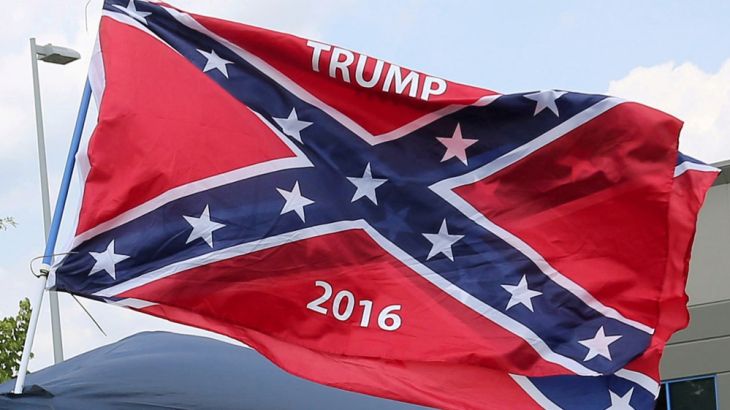US Confederacy statue rally sparks online anti-Semitism
In Charlottesville, Virginia, alt-right protesters bore torches in scenes critics say were reminiscent of KKK rallies.

The mayor of Charlottesville, in the US state of Virginia, has been the target of anti-Semitic tweets after speaking out against far-right white nationalists who converged on a local park carrying blazing torches the night before.
Mayor Mike Signer said two protests led on Saturday by Richard Spencer, a leader of the “alt-right” movement, came on the same day the city held its annual Festival of Cultures event, which celebrates diversity in the home of the University of Virginia.
Keep reading
list of 4 itemsSix takeaways from first day of Trump’s New York hush money criminal trial
Day 1 of Donald Trump’s first criminal trial
What is Donald Trump’s ‘hush money’ trial all about?
|
|
The protesters gathered on Charlottesville’s Robert E Lee Park, where a statue of the Confederate general that the city council voted to remove is located.
The city also voted to remove a statue of Confederate General Stonewall Jackson, located in another park. Both changes have been put on hold amid ongoing litigation.
‘Reminiscent of the KKK’
The Charlottesville protests were the latest of several in the US South in recent months over the removal of statues celebrating leaders of the Confederacy, the slave-holding group of states that broke with the North in the early 1860s, prompting the 1861-1865 Civil War.
“You’re seeing anti-Semitism in these crazy tweets I’m getting and you’re seeing a display of torches at night, which is reminiscent of the KKK,” Signer, who is Jewish, said in a phone interview with the Reuters news agency.
“They’re sort of a last gasp of the bigotry that this country has systematically overcome.”
READ MORE: Battle over Texas confederate monuments heats up
Signer issued a statement on Saturday criticising the torch-carrying marchers as either “profoundly ignorant” or aiming to instill fear.
“I smell Jew,” posted an anonymous Twitter user with the handle “Great Patriot Trump”.
“If so, you are going back to Israel. But you will not stay in power here. Not for long.”
Charlottesville rejects the alt-right's message of hate. Lee Park has been reclaimed. #NotInOurTown #LoveTrumpsHate pic.twitter.com/ZyM1tXuaGn
— Jennifer F Smith (@JFSmith434) May 15, 2017
Spencer, a well-known white supremacist who heads the National Policy Institute, is credited by some with coining the term “alt-right” to describe online and social media communities on the far right that include white nationalists, white supremacists and neo-Nazis, among others.
Although previously confined to websites, online media forums and social media, the alt-right came into the spotlight during the US election campaign and has been increasingly moving to protests and street confrontations in recent months.
|
|
In November, media attention honed in on the alt-right when, during a speech at a National Policy Institute conference in Washington, DC, Spencer chanted “Hail Trump, hail our people, hail victory!” as the audience gave Nazi-like salutes.
Steve Bannon, Trump’s chief strategist who is on the National Security Council, was previously the executive chair of the far-right Breitbart News blog, which he has described as the “platform for the alt-right” – although they were late to champion it and many alt-right supporters describe them as “alt-light”.
Violence erupts
At the Saturday afternoon rally, Spencer led chants of “You will not replace us”.
Later that night, he tweeted a photo of himself holding a burning tiki torch, his face illuminated with the hashtag “torchlight”.
READ MORE: What is the alt-right and what does it stand for?
The Charlottesville Daily Progress reported that chanters also cried: “Russia is our friend”, and “Blood and soil”.
The torchlight protest lasted only about 10 minutes, when police arrived on the scene after violence erupted, the newspaper said.
Charlottesville police did not immediately respond to a request for comment, but Signer said officers would be investigating to see whether any laws were broken.
Torches. Tonight. #Charlottesville. White supremacy. USA. 2017. A KKK-esque #SaveJacksonAndLee rally to instill fear with…@RichardBSpencer. pic.twitter.com/GBBjzXScHC
— Erin Schrode (@ErinSchrode) May 14, 2017
In recent years, a string of US southern states have moved Confederate-era monuments to museums, an effort that intensified after a white supremacist killed nine black people in a South Carolina church in June 2015.
Growing anarchist movement
The growth of far-right groups across the US since President Donald Trump’s election has been accompanied by a massive surge in membership for socialist organisations and anti-fascist activist groups.
During Trump’s inauguration on January 20, hundreds of anarchists and anti-fascists were arrested during a black bloc action, in which they covered their faces and clashed with police.
During that demonstration, an anti-fascist activist punched Spencer as he was being interviewed by reporters on camera. The video subsequently went viral on social media outlets and in the news.
The following months, protesters clashed with police and set fires at the University of California – Berkeley, leading to the cancellation of a talk by far-right provocateur Milo Yiannopoulos.
More recently, far-right protesters and anti-fascists clashed in Berkeley as violence erupted during pro-Trump rallies.
|
|